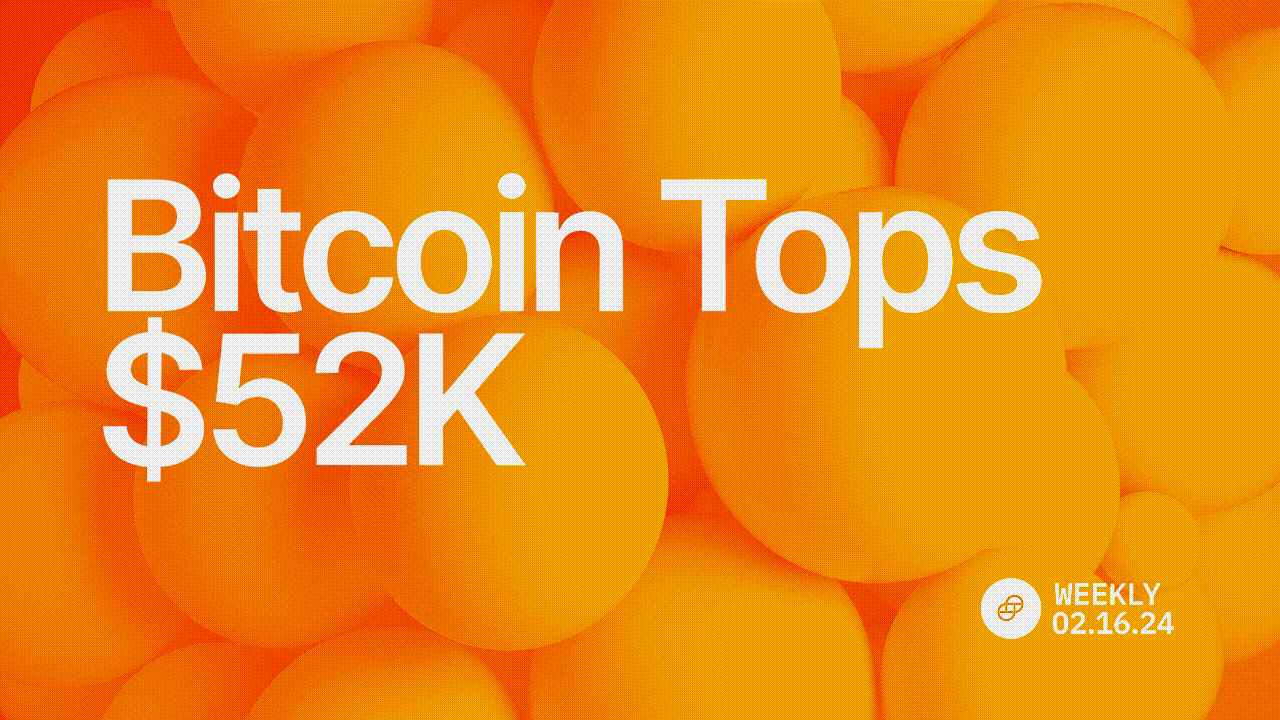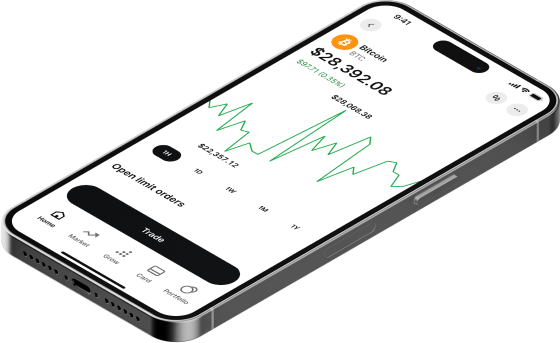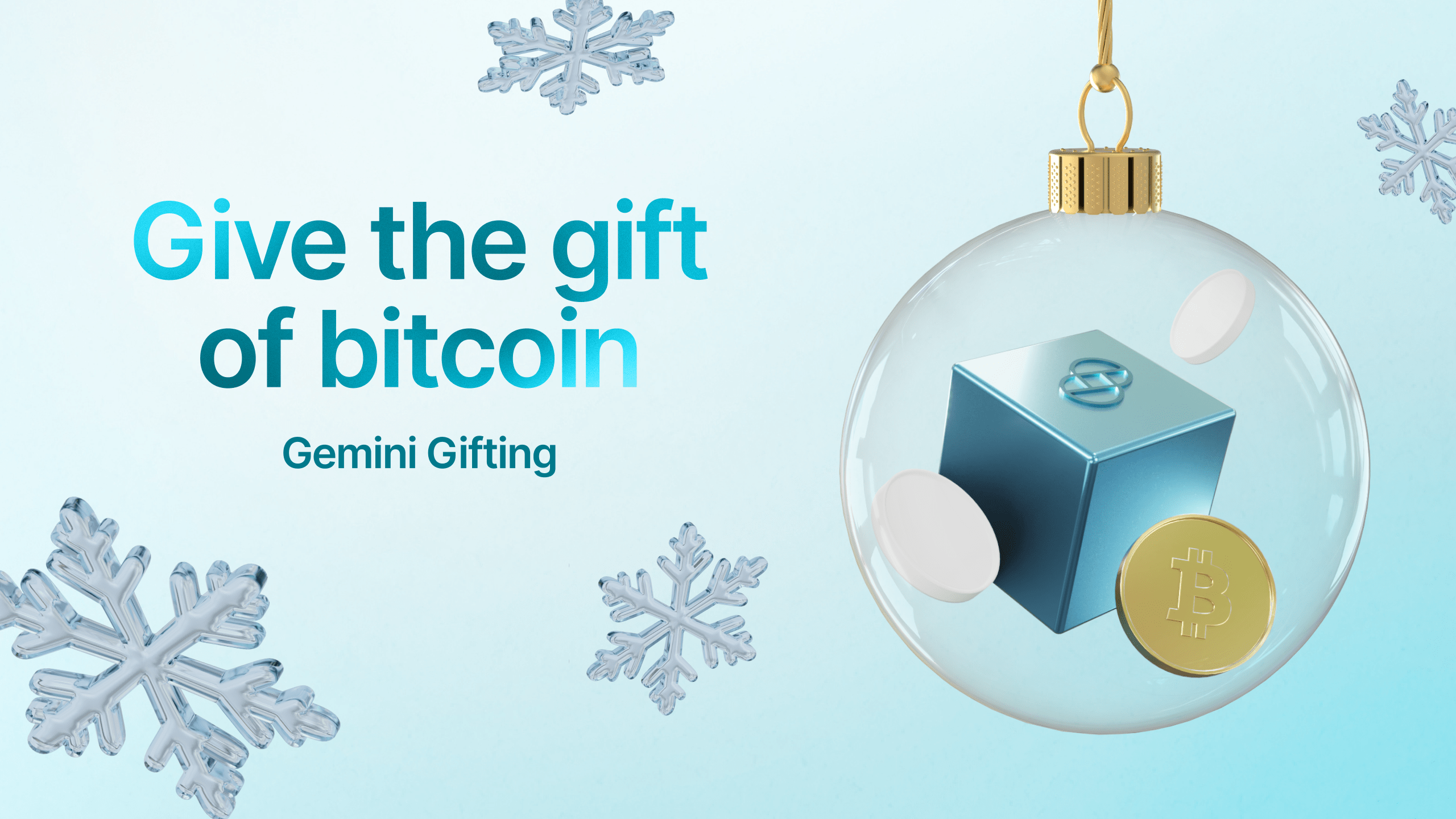Página inicial do blog
WEEKLY MARKET UPDATE
FEB 16, 2024
Bitcoin Tops $52K, Continuing its Surge, Ether ETF Conversation Reemerges, Stacks (STX) Gains Over 45% Buoyed by Bitcoin, Interest Rate Cut Expectations Lowered Following Strong CPI Data

Welcome to our Weekly Market Update.* Explore weekly crypto price movements, read a quick digest of notable market news, and dive into a crypto topic — this week we resurface our discussion of real-world smart contract use cases.
Crypto Movers
Crypto News
BitcoinBuzz Indicator
Topic of the Week

*Percentages reflect trends over the past seven days.
**Crypto prices as of Friday, February 16, 2024, at 11:40am ET. Check out the latest crypto prices here. All prices in USD.

Takeaways
- Bitcoin tops $52K as ETF inflows build: Bitcoin ETF inflows accelerated this week, with close to $1.5B of inflows over the first three days of the week, and four of the ETFs (excluding Grayscale) now hold over $1B in AUM just one month after launching. Blackrock's iShares Bitcoin Trust (IBIT) leads the pack with over $5B in AUM. As of Friday morning, BTC is currently trading around $52.1K, up 10% over the past week.
- Ether hits $2,800 as its own ETF conversation builds: This week Ethereum broke above the $2,800 level for the first time since May 2022, and investors are spying the $3,500 April 2022 peak should the recent bullish momentum continue. There are currently 9 ETF issuers that have submitted applications for an ether ETF. After experiencing the impact spot bitcoin ETF approvals had on the price of bitcoin and the large inflows that are coming in daily, investors could be expecting a similar move in ETH should an ether ETF be approved.
- Stacks outperforms, gaining over 45% this week: Stacks (STX), a project that aims to enable smart contracts and decentralized finance (DeFI) applications on the Bitcoin network, has been one of the biggest outperformers this week posting gains of 45% over the past seven days. The ability for Stacks to bring smart contract functionality to Bitcoin, has positioned the project well for increased attention alongside Bitcoin following the success of the spot ETFs.
- Interest rate cut expectations lowered as CPI comes in strong: The US consumer price index (CPI) released on Tuesday, showed consumer prices increasing more than expected in January, coming in at 0.3% on the month and 3.1% year on year, while 0.2% and 2.9% were expected. The market saw some readjustments to interest rate cut expectations following the release, now pricing in a 30% chance of a rate cut by the May FOMC meeting, down significantly from the near 100% chance priced in one month ago.
Sign up for a Gemini account
The secure way to buy, sell, store and convert crypto. Millions use Gemini to diversify their portfolios.

Bitcoin’s Surge Continues as ETF Inflows Build Up
The price of bitcoin (BTC) saw its first daily decline in over a week on Tuesday, dropping to $48.5K following the release of stronger-than-expected US consumer price index (CPI) data. Nevertheless, BTC quickly shrugged off the news and continued on its positive trajectory smashing through the $50K psychological level.
Bitcoin ETF inflows accelerated this week, with close to $1.5B of inflows over the first three days of the week, and four of the ETFs (excluding Grayscale) now holding over $1B in AUM just one month after launching. Blackrock's iShares Bitcoin Trust (IBIT) leads the pack with over $5B in AUM.
The persistent demand for Bitcoin ETFs may be putting upward pressure on BTC price, with Gemini co-founder Cameron Winklevoss outlining how this could accelerate as we reach the Bitcoin halving event in April, saying on X that “Bitcoin ETFs are taking 10x more bitcoin off the market than are being minted daily. If these inflows hold through the Halvening, then Bitcoin ETFs will be taking 20x more off the market than the daily mint.” As of Friday morning, BTC is currently trading around $52.1K, up 10% over the past week.
Ether Hits Highest Level Since May 2022 as ETF Conversation Ramps Up
After initially jumping to 0.06 on the ETHBTC pair directly after the launch of US-based spot bitcoin ETFs, the price of ether (ETH) has since struggled against BTC dropping as low as ~0.051 on Monday as strong bitcoin ETF inflows dominated the news. As the week progressed, however, increased interest in the possibility of an ether ETF approval later this year started to gain momentum once again.
After experiencing the impact spot bitcoin ETF approvals had on the price of bitcoin and the large inflows that are coming in daily, investors are eyeing a similar move in ETH price should an ether ETF be approved. There are currently 9 ETF issuers that have submitted applications for an ether ETF. This week Ethereum broke above the $2,800 level for the first time since May 2022, and investors are spying the $3,500 April 2022 peak should the recent bullish momentum continue.
Stacks Up Over 45% Amid Excitement Around Bitcoin Smart Contract Functionality Potential
Stacks (STX), a project whose goal is to enable smart contracts and decentralized finance (DeFI) applications on the Bitcoin network, has been one of the biggest outperformers this week posting gains of 45% over the past seven days, breaking above its previous all-time-high of $2.45, to currently trade at $2.58.
The ability for Stacks to bring smart contract functionality to Bitcoin, which lags behind other networks the likes of Ethereum in the space, has positioned the project well for increased attention alongside Bitcoin following the success of the spot ETFs. Total Value Locked (TVL) on the network has also jumped, reaching $83M, up from $53M at the start of the month according to DefiLlama data.
Consumer Price Data Tops Expectations, Lowering Likelihood of May Rate Cut
US stocks markets experienced one of their worst days of the year on Tuesday after inflation numbers came in hotter than expected. The US consumer price index (CPI) released on Tuesday, showed consumer prices increasing more than expected in January, coming in at 0.3% on the month and 3.1% year on year, while 0.2% and 2.9% were expected.
Although coming in higher than expectations, inflation has slowed since December (3.4%) and is not likely to change the Fed’s stance on starting rate cut rates this year, with Chicago Fed President Austan Goolsbee noting “Let’s not get amped up when you get one month of CPI that was higher than what you expected it to be. It is totally clear that inflation is coming down.”
Nevertheless, the market did see some readjustments following the release, now pricing in a 30% chance that we see a rate cut by the May meeting, down significantly from the near 100% chance priced in one month ago. Investors are also now pricing in closer to four rate cuts this year, which is down from the six cuts seen at the start of the year.
-From the Gemini Trading Desk


BitcoinBuzz data as of 5:10pm ET on February 15, 2024.
To learn more about the BitcoinBuzz Indicator and its components, read our introduction here. Check back every Friday for an updated score!

Real-World Use Cases for Smart Contract and dApps
We’ve discussed smart contracts and the role they play in the decentralized finance (DeFi) ecosystem a number of times in our topic of the week. This week we dig into some real-world use cases for this important DeFi building block.
As a reminder, a smart contract is self-executing code that carries out a set of instructions, which are then verified on the blockchain. They are a core technological element of many decentralized applications (dApps). A key characteristic of smart contracts is that they are trustless, meaning they can reduce or even eliminate the need for third-party intermediaries. Read on to learn how smart contracts are impacting the worlds of finance, real estate, healthcare, gaming, and more.
Smart Contract Use Cases in Finance
Providing an alternative to traditional financial services is a key smart contract use case. DeFi dApps provide parallel services to the banking and financial services industry — like lending, borrowing, trading, and a host of other financial services — along with entirely new types of products and decentralized business models that can offer considerable benefit and utility for users. With the increased transparency furnished by smart contracts (along with 24/7 functionality, and reduced costs), dApps have the potential to lower the barriers to entry into the financial services arena for people all over the world.
NFTs and Smart Contracts: Blockchain Technology in Gaming
Blockchain technology in gaming is commonly driven by non-fungible tokens (NFTs) — unique digital assets that represent in-game content. NFTs rely on smart contracts. These tokens are unique, rare, and indivisible, while the blockchain networks that underpin NFTs facilitate player ownership, provable scarcity, interoperability, and immutability. Together, these characteristics of blockchain in gaming have the potential to drive mainstream adoption and a more equitable value model.
Smart Contracts and Blockchain in the Legal Industry
Perhaps one of the most promising real world smart contract use cases is their potential to function as legally binding contracts — the kind that inform most of today’s business engagements. Technology has been driving innovation in the legal industry, most recently with the advent of e-signatures for binding legal agreements.
The widespread use of bespoke smart contracts for myriad types of transactions that can lower costs and increase transaction speeds may be closer than you think. Some U.S. states have started to allow the use of smart contracts and blockchain in the legal industry in certain contexts. Arizona, for example, allows enforceable legal agreements to be created via smart contracts, and California allows marriage licenses to be issued via blockchain technology.
Blockchain in Real Estate
Through tokenization, smart contracts are advancing the fractional ownership of assets and thus lowering the barrier to entry for investment for many by merging blockchain and real estate transactions.
Smart contract technology can also rework the documentation and transaction processes by incorporating blockchain in real estate transactions. For example, the Republic of Georgia (in the Caucasus region) has been developing a blockchain-based land title registry since 2016, and similar projects are underway in other jurisdictions such as the United Arab Emirates (UAE).
Read more about some of the ways smart contracts and blockchain are being used in the real world.
See you next week. Onward and Upward!
Team Gemini
*This material is for informational purposes only and is not (i) an offer, or solicitation of an offer, to invest in, or to buy or sell, any interests or shares, or to participate in any investment or trading strategy, (ii) intended to provide accounting, legal, or tax advice, or investment recommendations, or (iii) an official statement of Gemini. Gemini, its affiliates and its employees do not make any representation or warranty, expressed or implied, as to accuracy or completeness of the information or any other information transmitted or made available. Buying, selling, and trading cryptocurrency involves risks, including the risk of losing all of the invested amount. Recipients should consult their advisors before making any investment decision. Any use, review, retransmission, distribution, or reproduction of these materials, in whole or in part, is strictly prohibited in any form without the express written approval of Gemini.
ARTIGOS RELACIONADOS

DERIVATIVES
DEC 13, 2024
Introducing Four New Perpetual Contracts on Gemini’s Derivatives Platform: HYPE/GUSD, SHIB/GUSD, UNI/GUSD, BCH/GUSD

INDUSTRY
DEC 13, 2024
Gemini Gifting is Now Available for US Customers

WEEKLY MARKET UPDATE
DEC 12, 2024




